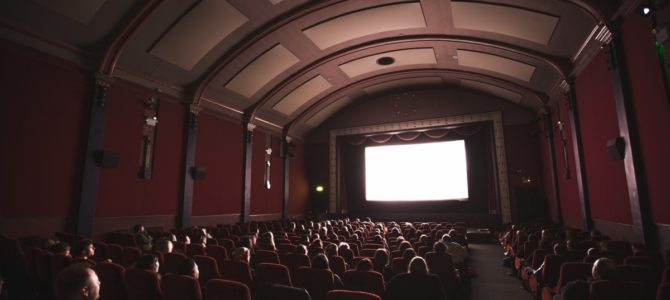
In significant ways, culture is a set of shared stories, a narrative about who its members are, and what they believe, desire, and fear. This relationship between story and society is not only ancient, it is arguably the thing that makes us human.
Stories tell us right from wrong, teach us our history, and, importantly, give members of society touchstones of common understanding. For most of the 20th century in American society, movies provided a multitude of such common touchstones, but today, our most popular movies are almost never fully original stories.
Looking back 30 years, the difference is stark. Here are the top-ten-grossing films from 1988.
- “Rain Man”
- “Who Framed Roger Rabbit”
- “Coming to America”
- “Big”
- “Twins”
- “Crocodile Dundee II”
- “Die Hard”
- “The Naked Gun, From the Files of Police Squad”
- “Cocktail”
- “Beetlejuice”
Depending on how you categorize “Roger Rabbit,” only two or three of these films were developed from a previously existing story or franchise. The rest were fully original stories, some of which secured solid places in the shared narrative of our cultural life. They generated wholly new moments and phrases that took on almost universal significance.
By 2018, the ratio between original and franchised stories had been turned on its head, as we can see by the list.
- “Black Panther”
- “Avengers: Infinity War”
- “Incredibles 2”
- “Jurassic World: Fallen Kingdom”
- “Deadpool 2”
- “Dr. Suess’ The Grinch”
- “Mission Impossible-Fallout”
- “Ant-Man and the Wasp”
- “Solo: A Star Wars Story”
- “Venom”
Not one of these movies is an original tale that is not connected to a franchise or pre-existing narrative universe. A full 5 of the 10 are Marvel universe movies. This is a stark change over a mere three decades. It speaks to a broader trend in art and entertainment, one in which new stories, new ways of exploring our world, no longer have the ability to saturate our culture and become part of our common cultural heritage.
It could be rightly noted that the kind of original narrative storytelling we saw in movies like “Rain Man” and “Big” has shifted to television. It may be that we are living in a golden age of television, but if so, a big part of the reason is that there are so many television networks making original content that there is truly something for everybody, but nothing for everyone.
Even in the realm of television, no narrative content can approach the level of saturation achieved even in the 1990s. Of the top 20 most watched television episodes ever, none are from after 2000. The most recent episode to crack the top 100 was the “Seinfeld” finale in 1998.
In the top twenty, many had strong sociopolitical content. Several episodes of “Roots” appear on the list, as were the final episodes of “All in the Family” and “MASH.” No television show today could ever dream of reaching as many Americans, all at once, as these shows that poked at the American political and social consciousness.
This dearth of shared narrative content has a profound effect on our society, which has already lost much of its biblical and historical literacy, and in which the literary canon is being broken up and replaced by more modern, diverse offerings of novels, poems, and plays. If part of the goal of storytelling is to tell us how we ought live, Americans are getting a far less uniform message from today’s art and entertainment.
“The Cosby Show’s” impact on race relations, “Rain Man’s” on awareness of autism, and “Coming to America’s” on our view of the values and virtues of our nation is not possible now. Today’s onscreen entertainment, particularly the original content, is directed to specific demographic groups, not our society as a whole. As such, it far more often confirms for viewers that the world is what they already believe it to be, rather than stretching their vision to ideas they had not considered.
Giving the Guttenbergesque power of our information systems today, it is easy for the loss of shared storytelling to get lost in the mix. After all, the Internet has changed how we communicate and experience the world, in almost every way possible. But near-miraculous advances in communication are not unprecedented. The telegraph and telephone were arguable equally powerful inventions in that regard. What is unprecedented is the diffuse nature of today’s entertainment and storytelling.
Unsurprisingly, one very old story gives us a model for what happens when our common narrative language is stripped away. In the Bible, when the Tower of Babel was built by men to pierce the heavens and to become more godlike, God confused humans’ tongues by creating myriad languages. Without their common language, the people’s goals were thwarted.
When we ask ourselves how our society has become so divided, so angry, and so bereft of understanding for those we disagree with, we most often think about politics. But, as Andrew Breitbart knew, politics is downstream from culture. A society without shared stories may be fundamentally incapable of finding enough common ground and mutual understanding to function properly.
Without common fictions, we are left only with common realities, the dark drumbeat of increasingly partisan politics, and the promise of a better world paraded in advertisements. In fact, just about the only form of narrative content that can saturate these days is television ads. Far more people know the phrase “Dilly Dilly” than know a thing about “The Man in the High Castle” or “Modern Family,” because ads can cross the borders of content outlets.
The lack of shared original storytelling in our society is a growing problem. It makes it harder for us to see ourselves in others. There is no easy, or perhaps even possible or desirable, solution. Part of the problem is that the wealth of talent, which has always existed, is abundant, and with the advancement of more and cheaper platforms, that talent is going to turn into good content that enough people will want to watch.
Perhaps some new technology will open up a door to saturating original storytelling again. Something like virtual reality could be a distinct enough experience with a prohibitive enough production cost that it requires new methods of storytelling by a relatively few artists. But I doubt it.
For now, we are left with a society that lacks the kinds of storytelling touchstones that every previous generation of mankind has taken for granted. We occupy the same space, but not the same culture. So far, the results are troubling.









